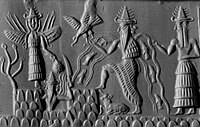Abzu
(Redirected from
Apsu
)| Abzu | |
|---|---|
| Personal information | |
| Consort | Tiamat |
| Children | Kingu (Babylonian religion), Lahamu, Lahmu, Anu (Sumerian religion) |
| Part of a series on |
| Ancient Mesopotamian religion |
|---|
 |
|
|
The Abzu or Apsu (
Kur) and the earth (Ma
) above.
In Sumerian culture
In the city of
.In Sumerian cosmology
The Sumerian god Enki (Ea in the Akkadian language) was believed to have lived in the abzu since before human beings were created. His wife Damgalnuna, his mother Nammu, his advisor Isimud and a variety of subservient creatures, such as the gatekeeper Lahmu, also lived in the abzu.[4][5][6][7][8]
As a deity
Abzu (apsû) is depicted as a
Assurbanipal (c. 630 BCE) but which is about 500 years older. In this story, he was a primal being made of fresh water and a lover to another primal deity, Tiamat, a creature of salt water. The Enūma Eliš begins: "When above the heavens (e-nu-ma e-liš) did not yet exist nor the earth below, Apsu the freshwater ocean was there, the first, the begetter, and Tiamat, the saltwater sea, she who bore them all; they were still mixing their waters, and no pasture land had yet been formed, nor even a reed marsh." This resulted in the birth of the younger gods, one, Enki, would later contain Apsu when he plotted to kill them because of their noise. Enraged, Tiamat gives birth to monsters, filling their bodies with "venom instead of blood", and made war upon her treacherous children, only to be slain by Enki's son Marduk
, the god of Storms, who then forms the heavens and earth from her corpse.
In popular culture
Abzû is a 2016 adventure game that was influenced by Sumerian mythology of Abzu.[10]
See also
- Abyzou – Name of a female demon
- Cosmic ocean – Mythological motif
- Firmament – Solid dome dividing the primal waters
- Nu – Ancient Egyptian personification of the primordial watery abyss
- Varuna – Hindu deity associated with water
- Wuji – The primordial in Chinese philosophy
Notes
- ISBN 9789004122598.
- ^ Green, Margaret Whitney (1975). Eridu in Sumerian Literature. University of Chicago: Ph.D. dissertation. pp. 180–182.
- ISBN 0-292-70794-0.
- ISBN 978-1134625529.
- ISBN 0931464994.
- ISBN 978-1108490542.
- ISBN 978-0190903015.
- ^ N. Pope, Charles (2016). Living in Truth: Archaeology and the Patriarchs (Part I): Early Pharaohs. DomainOfMan.com. p. 17.
- ISBN 9780816029099– via Internet Archive.
- ^ Haske, Steve (2016-09-27). "Exploring the Hidden Depths of 'Abzû'". Inverse. Archived from the original on 2017-03-09. Retrieved 2017-04-22.
External links
 Quotations related to Abzu at Wikiquote
Quotations related to Abzu at Wikiquote

